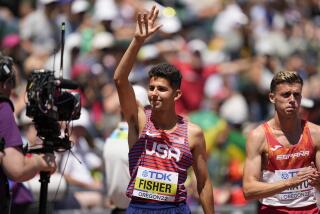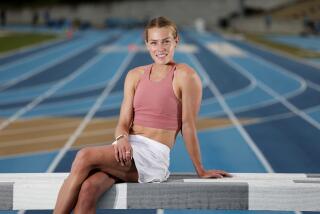Salazar, Recovering From Injuries, Is on the Road Again, Ready to Race
- Share via
EUGENE, Ore. — He hasn’t won a marathon in four years, but don’t tell Alberto Salazar that his career as a long-distance runner is washed up.
“I know I’ll run faster at every distance than I’ve run before,” he said. “I’m just reaching my peak years now. Physically, I know I’m better than I ever was before.”
It is an older and wiser Salazar who, at age 27, is in the late stages of rehabilitation following a pair of hamstring operations and knee surgery last year.
He was the brash wunderkind of the marathon in 1981 and 1982, winning his first four attempts at the event, including the New York Marathon twice and the Boston Marathon once.
His 1981 New York clocking of 2:08:13 was a world’s best at the time, although the time was disqualified by The Athletics Congress after authorities said the course was too short.
His troubles began shortly after his second New York victory in 1982. Under stress from his self-imposed drive for perfection, he lacked his usual intensity. A series of illnesses aggravated his problem.
Salazar’s unbeaten marathon string ended with a fifth-place finish in the Rotterdam Marathon in 1983. He was 17th in the world 10,000-meter championships the same year.
That was when he decided he needed rest. He didn’t run for two weeks. He qualified for the U.S. Olympic marathon trials with a fifth-place finish in a race in Japan, and made the U.S. squad.
Shortly before the Olympics in Los Angeles, he was diagnosed as having an iron deficiency, a problem that was resolved by medication.
His litany of troubles culminated with a disappointing 15th place finish in the Olympic marathon.
He didn’t talk about it, but recurring pain he had suffered in his right hamstring since his high school days was intensifying.
“I’d had so many problems, it would have been just one more excuse,” Salazar said. “I remember limping the last 10 miles of the (Olympic) marathon.”
Doctors finally decided to operate. He underwent surgery on his left knee and right hamstring last year. A second hamstring operation was conducted later. In addition, he suffered nerve damage, either from the operations or from his earlier running on the injured leg.
“You can’t do anything to help a nerve injury along,” he said. “You’ve just got to wait.”
Salazar figures the waiting is nearly over. For the first time since he was a teen-ager, he said, he has no leg pain when he runs.
“It may not be 100% yet,” he said. “I’m still having problems getting my speed down . . . I think by the end of the summer I can be 100%. I’m able to train 100% right now.”
He’s running 95 to 100 miles a week, plus another three hours of running with the help of an inflated vest in a swimming pool. The pool running, he said, is good for conditioning because it allows him to avoid the pounding of road running.
Salazar returned to competition May 31 with a second-place finish in a 10-kilometer road race in Bolton Landing, N.Y. He said he’s in better shape than the race indicated and that he’s disappointed with the slow time.
He plans to run in a few 5,000- and 10,000-meter races in Eugene this summer. His first major race may be the Falmouth, England, road race later this year.
As for a marathon, if things go well, he will run one in the fall. His sights, however, are on the 1988 Olympics in South Korea, where he’d like to atone for his showing in Los Angeles.
“That’s why I’m not in a real hurry right now,” he said. “I’d like to run very well next year and run great the following year. It’s hard to keep that peak all the time.”
Salazar, who still holds the U.S. best in the marathon, says he tries not to be bitter about losing the world mark, although he remains certain he ran the proper distance that day.
“I’m not going to worry about it any more because I know I’m going to run faster,” he said. “I would just hate to be somebody who got his self-worth from saying, ‘I did this or I did that in the past.”
“Confidence has never been a problem for me,” he said.
Salazar, who has a year left on his contract to promote Nike products, certainly shows no signs of economic sacrifice for his athletic struggles. He lives with his wife, Molly, and two young sons in a luxurious hillside home on the outskirts of Eugene.
He said a published report that he earned $360,000 in 1984 is “in the ballpark.”
Salazar said he’s better prepared mentally for his latest try at the world’s most grueling running event.
“I think I’ve had a change in priorities and a realization that running is not the end of the world,” he said. “I think I’m just as determined as I was before. But unlike before, I think I’m more patient now. I’m smarter.”
More to Read
Go beyond the scoreboard
Get the latest on L.A.'s teams in the daily Sports Report newsletter.
You may occasionally receive promotional content from the Los Angeles Times.






